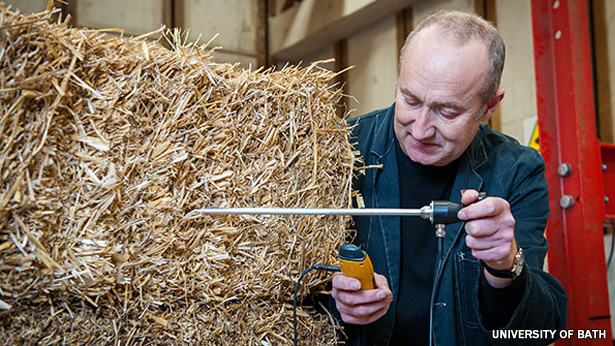
11 February 2015
The first straw bale homes to be offered on the open market are going on sale in Bristol – a move set to generate new interest in this alternative method of self/custom build construction.
{TEASER}
The homes in Shirehampton, promising fuel bills up to 90% cheaper than an equivalent brick-built house, are the result of research from the University of Bath’s Department of Architecture & Civil Engineering and represent for the first time an affordable, low carbon and fuel-efficient means of housebuilding. A new factory-built straw panel design developed at the University has received BM TRADA’s Q mark certification, meaning insurance policies and mortgages can now be secured on homes built using this sustainable construction practice.
The seven Bristol townhouses were built by developers Connolly and Callaghan using the innovative ModCell straw panels, in which an engineered timber frame encloses the compressed straw bale insulation. Constructed with the load-bearing straw panels within an airtight design (plus triple glazed windows) the new houses will need significantly less conventional heating. Their super-insulated straw walls provide three times’ greater insulation than required by current UK building regulations so fuel bills are anticipated to fall by up to 90 per cent.
Building with straw bales is one of many alternative construction styles employed by self and custom builders alongside cob and rammed earth. A ModCell straw panel design is one of six now available to home buyers in Cornwall’s custom build housing scheme at Trevenson Park South. Straw-built homes also feature at the multi-award winning LILAC co-housing community in Bramley, West Leeds, where residents benefitted from a 20 per cent lower build cost and 90 per cent cheaper energy bills than on average in Leeds, demonstrating the significant savings that straw buildings can offer.
Professor Pete Walker (pictured), Head of the University’s Department of Architecture & Civil Engineering, said: “As a construction material straw is a low-cost and widely available food co-product that offers real potential for ultra-low carbon housing throughout the UK. Building with straw could be a critical point in our trajectory towards a low-carbon future.”



